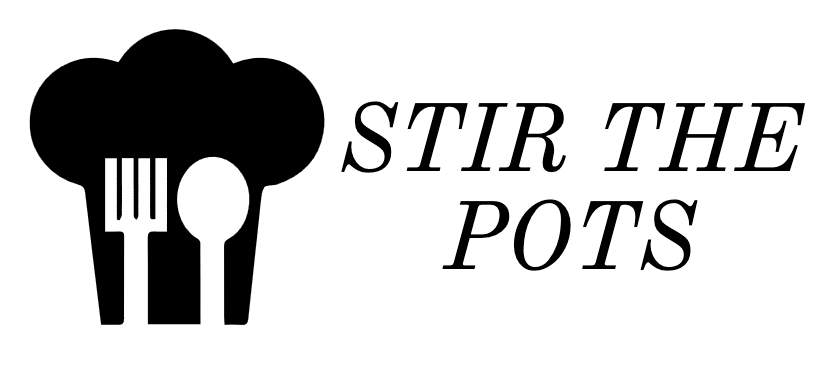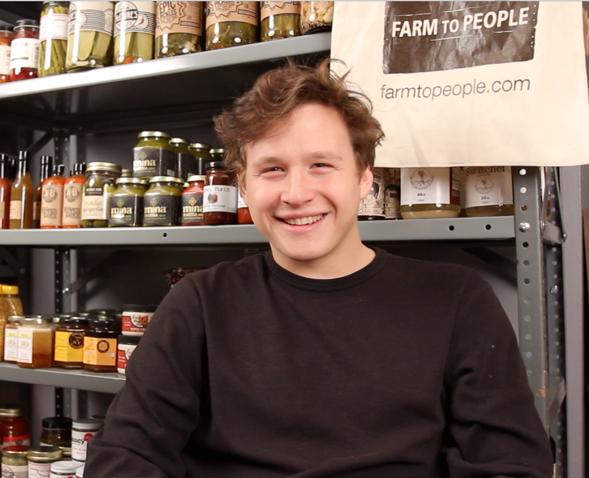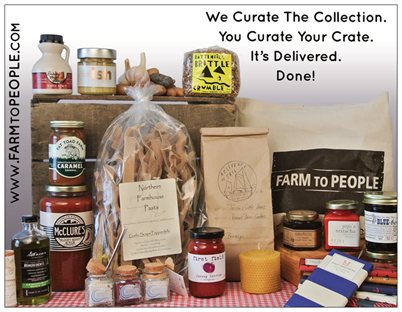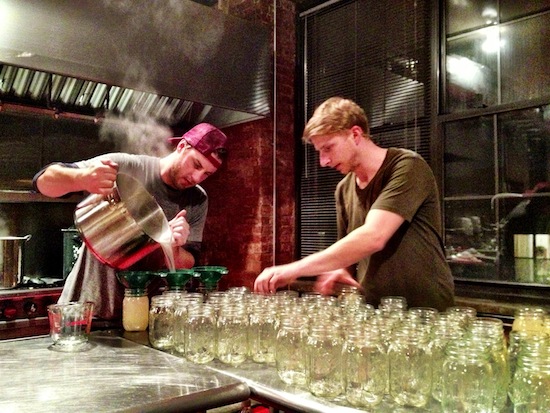Michael Ray Robinov grew up as the son of a food entrepreneur, a weekly Union Square farmers market participant, and a student at a school where kids were taught out of textbooks they helped write and produce. After starting his first year of college in 2012, he left this past summer to found and run a food company, Farm To People.
A business that seems designed around Robinov's creativity, food fascination, and passion for social good, he and his founding partner sell and deliver a range of crafted products made by Northeast-based farmers. We spoke to him recently about the inspirations around Farm to People, and today's challenges of starting a food business.
Q: What are you doing with Farm To People?
Michael: We’re trying to create a regional hub for small producers who make things in small batches with natural ingredients, without genetically modified ingredients. We want to go back to the way things were–and should be–created.
All of our meats and cheeses come from healthful, pasture-raised animals. All of our products are crafted in small batches, by hand, with purposeful ingredients. Our producers are really conscious of what they put in their products. We want to provide a platform for our local community of makers.
The other thing I want to achieve with Farm to People is higher transparency. Knowing where your food comes from. When you buy a can of tomatoes in a supermarket today, all you know is that the tomatoes come from Italy…or California. With Farm to People, we want people to know exactly where the food is coming from and who is actually making it. You can even contact the makers personally! None of our makers are huge companies from someplace where you're hitting a long chain of command and from whom you probably can't get a straight answer. Most of our producers are 1-2 employee companies where you can get right to the source.
Q: I'd love to get your input on a few things you've said, such as "small batches made by hand with purposeful ingredients." And that the makers want to “fulfill a purpose." What’s the importance of purpose in the life of you and the folks whose products you're selling?
Michael: First, I think it’s more that within their food they want each ingredient to fulfill a purpose. For instance, a lot of skin care products are loaded with cheap, unnecessary fillers. Take a company like L’Oreal. They may throw in an ingredient like Shea Butter, but the rest of the ingredients will be synthetic fillers. As you can see on our site, our face and body creams are somewhat expensive. That’s because the producers use only the finest ingredients. Those ingredients are costly and bought in small bunches as opposed to bulk. And there are no cheap fillers. One of our body care makers, S.W. Basics of Brooklyn, makes all of her products with only five ingredients. That's what I mean when I say that everything in a product has a purpose. It's there for a taste or a reason or a benefit–not just to bring the price down.
The second thing is: wouldn’t you, as someone from the Northeast, rather support someone in your community or region who is bringing jobs back to a regional level? By buying locally, you’re helping the farmers. You're helping the land. You’re helping the person making the final product. You're giving back rather than buying from mass-produced foods from nameless farms where you don’t know whom you’re supporting. In this local model, you can have control over who you're giving back to.
Q: It sounds like Farm to People is really trying to provide a way for people to have an actual relationship with those who produce their food.
Michael. Yes, that's really what it boils down to. And also to eat healthier. Those are two big ones. Know your food. Eat healthier. Know where your food is coming from. And support your region. Support your farms and local makers. Those are some of the bullet points.
Q: You use the term "local makers." What's attractive to you in that word "maker?"
Michael: In my own head, it has this connotation that someone is crafting or making something. To make something is very personal. Our makers really jar and paste the labels on by hand. None of these products comes off a conveyer belt. I think of the conveyer belt as a manufacturer. Our people are producing in small kitchens with one person canning, one person boiling, one person making.
Q: Is there anything in today’s world that makes such food products more relevant than they were 10 or 20 years ago?
Michael: We’ve seen a big change over the last 50+ years in the food world. In the 1950s, milk was still delivered from local farms to people’s homes. There used to be butchers. There used to be cheese makers. There used to be bread bakers. It wasn’t a one stop shop as much as it is today. With the rise of Whole Foods, Wal-Mart, Target and Food Emporium, you’ve lost that personal touch. Even though most cities still have some oftheir old butcher options, for many Americans, the options are more limited. And, just for convenience sake, you find yourself at the big supermarkets. I want to create a shopping experience where you can get your meats and your cheeses and your breads – where you can get your whole shopping list – in one stop but still have the ability to know exactly whom you’re buying from.
Q: Do you see yourself ever having an actual store?
Michael: Quite frankly, physical spaces – especially in NYC – are very expensive. And we don't have the capital. Also, I really think online shopping is the future.
Q: You're 21 years old and running your own business. I guess in today's world that can be common. A lot of 21 year olds are still in school. What led you to where you are today.
Michael: I did a year at NYU in something totally unrelated. I felt a little unfulfilled. It’s hard to pinpoint. But I kept feeling drawn to food. And my father is a natural food veteran. He’s been in the natural food business since the 1970s. He had a number of retail stores in New York, Brooklyn and Westchester County. And he developed a brand. I’ve been able to watch him since I grew up. And our family is very – we’re very much involved in what we eat and interested in where our food comes from. Farm to People sort of developed out of a family conversation with my mom and dad and my sister and me.
We feel that Whole Foods has lost a bit of its transparency and its food discernment. A lot of their products are filled with corn syrup. White flours. They’re doing a better job lately of being transparent, but Farm to People just started out from this conversation that Whole Foods is so big and it's so hard for small batch producers to get in and get distribution. Just to get in the front door of Whole Foods, you need a lot of capital. They and their national distributors require so many demos and samples and this and that. And you need to keep up with their production. They’re very demanding and if you don’t fulfill your requirements, they drop you very quickly. That can be very hard to work with and devastating for these small companies.
So the actual business came out of this family conversation. My father – it was his and my idea to try this regional hub. He’s been an incredible source of knowledge as I try to build the company. And then a friend at NYU – who was a computer science major – he just graduated. He's 23. Over the summer, he came on to build this web site and give it a try. We launched in September. And have been beta testing since then. Obviously, a lot more work and tweaking needs to get done and we want a lot more people to discover us.
Q: What has most surprised you in the process?
Michael: That's a good question. When I talk to people about the idea, they're really enthusiastic. But to get people to commit to something that they can’t touch, that’s a whole other thing. So it surprises me that while e-shopping works with Zappos and Amazon, people don't seem as likely to try it with foods. I think it's about building trust. But it does surprise me that people are so wary
Q: Any insights on why food more than books is something that people are more worried about getting in the mail?
Michael: Hmmm. What are your thoughts? I'm still trying to figure it out.
Q: Well, maybe while the convenience stores – the big supermarkets – don't tell you about their growers or makers of what they sell – you can have a relationship with their store. You know where it is. You go in. You go out. You have people you know there. You get to know the aisles. You do develop a relationship.
Michael: That's true. It's like for 20 years I’ve been going to that store on my way home from work and I know exactly where that rice is, my bread. It took time with Zappos. It used to be that way with shoes, too. How could I buy a shoe without knowing how it fits? But look at them.
Q: I read on your site that, as a kid, you grew up spending your weekends at Farmers Markets. Some kids would have been playing sports or playing with computers. You were at the farmers markets. What made going to those markets every weekend fun for you?
Michael: First of all, it was a job. But what made it a better job than working at other stores, for instance, was knowing the roots of my food and just being involved with being one of the makers. I wasn’t the maker but I could represent the farm, the maker. You would see the same person week after week. They would build a relationship with our stand. They would know their bread. They would know their vegetables. They would know they want their sauerkraut. I just found that so fascinating.
But it was a double-edged sword. I loved the community that the Farmers Market created. But I remember being there on Saturdays, say 2 pm on a beautiful spring day, and there are 1000s of people standing in line asking, “is there anywhere else I can get this amazing stuff?” But the answer was, "not unless you drive up to their farms.” And I kept thinking there should be a place where you can buy all of this cool delicious local food in a more convenient way where you still know who is making it.
Q: Anything else that you learned in those experiences or just being the son of a man in the food business?
Michael: What I learned is the importance of personal relationships. How to talk to people. How to listen to people. How to care about what they want. And how to sell. I think that's what I’m trying to bring. My personality and salesmanship to a warm, informative and friendly online space.
I like when people write or call our web site. I really try to answer and be as helpful as possible. And show people who want to buy on our site that I’m present and that we really care about our customers. That was the number one thing I learned from the Farmer’s Market is to care about every single person who comes to the site. You have no business without the customers. My dad taught me that hanging out at his stores when I was a toddler.
Q: “You're nothing without your customers.” Your father is a smart guy. Can you paint a picture – actually, you’ve been painting some great pictures, but can you paint a bit more of a picture of how your dad taught you that?
Michael: My dad is one of those guys who has sayings like that.He’s one of those guys who has this tough love personality where since I was really young, he wanted me to understand the importance of hard work and of his hard work.
Q: How did he teach you about the importance of hard work?
Michael: Well, my dad was never one – he didn’t do well in school, himself. He was more about – for some parents it’s about getting your good grades in school and going to a good college and getting a good job. He came from this background where he put himself through college but he never got the good grades and he didn’t know how to “do” school. He was an entrepreneur. And he made himself a success. That’s sort of what he instilled in my sister and me. Do what you need to do to get it done. And be honest and truthful and love what you do. That's more important than anything else. It’s not about the grade. It’s never about the grade. It's about doing it well and doing it with your full heart.
Q: Can you remember seeing your dad in moments that really embodied that attitude of doing things well and doing them with your heart?
Michael: We were really lucky because when I was in sixth, seventh, eighth grade, he had a company called Mediterranean Organics. It's an olive and caper company. We got to travel to Greece and Turkey and Italy and to see his factories where the food was coming from. I just remember his pride when he showed me the factories. I got to work in a jam factory. And I remember the hard work and pride at sourcing the best tomatoes in Turkey. And literally eating tomatoes from the vine.
With that company he cared so much about where the products were coming from and that the workers being treated properly. Seeing work conditions and what they go through. I got to see a little part of that. And I see that even more now when I bring to him different companies and he says, “well, that sounds like a great company. We should reach out to them.” Or he says, “what’s the story behind X company.” I really have to sell him. He wants to see that I’ve done my research and that we’re creating the richest possible site. He really shapes my work ethic and my sourcing. Because he tells me it's more important to deliver uniqueness and quality and never compromise just to be popular. You’ll be popular if you do the right thing and stick, I guess, to your mission. He’s a mission-based guy.
Q: Can you highlight some of the makers you’re working with?
Michael: Yes, they’re the real reason we’re doing the company. Each one has a story. I like to talk about these guys behind Switchel. which is an old American heritage beverage. It's been around since I think the 1700 or 1800s. I'm not exactly sure. They bill it as the original Gatorade. It's what farmers used to drink after a long day’s work. It's apple cider vinegar, ginger and maple syrup. They make it with NY Apple Cider vinegar and Vermont Maple Syrup. And it’s this powerful replenishing drink that is delicious and healthy and can be really fun when mixed with rum or whiskey. These are two young guys – in their 20s, I think – who’ve created a recipe their grandmother gave to them. That's one company that embodies the Farm to People energy – a family recipe done with local ingredients and a lot of care.
A new body care company that we just brought on is Angelhill Apothecary. This woman has a small farm in the Hudson Valley. She grows all of her own herbs. And she harvests them all. In order to make her different body oils and creams, she harvests the different herbs and stores them in glass mason jars out in the sun for a year. This heating of the jars from the sun allows the essential oils to seep out from the plants and collect in the jars. After a year, the oils are separated from the leaves and she infuses the oils into her products. I think that is absolutely awesome. It’s called wild crafting. That's the type of story we look for – the care and craft and dedication that all our products embody.
Q: It sounds like she embodies something between a shaman and a doctor – sort of a “doctor of old.”
Michael: It really is an art. It takes its time but allows nature do its thing to the nth degree. She doesn’t try to speed up the process in any way. She has this comfrey cream and people just love it. So that’s another good example of this care.
Also the localness. All of her oils and a lot of her products are locally sourced. We're a local or regional company but, obviously, we have chocolate and products with sugar. And cocoa and sugar don't grow locally, but our farmers who do source cocoa beans and sugar work very closely with small family farms in South America, New Guinea or the Dominican Republic. It can't all be local but when it’s not, we want to make sure the companies are aware of their sources. I just wanted to add that as another bullet point. It probably should go earlier in writing up our conversation, no?
Q: Maybe. But that’s interesting to hear how you think. Editing as you talk. I sometimes do that.
Michael: I just know from talking about the company and people asking questions, like when they are saying everything is supposed to be local, but “is the chocolate local?" And I say it's not local and never will be, but we watch out for how it’s sourced.
Q: How do you find discover and find new product makers?
Michael: A lot of it is going around to different food markets. Going to local incubators. There are food incubator buildings in Queens and Brooklyn where all these makers have set up shop and make their products. A lot of our producers are based out of the old Pfizer building in Brooklyn. There are floors of kitchens of different companies making their products. I also do a lot of research. Looking companies up online. Traveling around the northeast. And more and more people are reaching out to us to carry their products.
Q: What is the traffic so far on your site? How has it grown?
Michael: It's grown a lot. We opened in September. Since then it continues to grow. We’ve been really aggressive with events lately. That's really helped get the word out. We’re doing the Amsterdam Market at the South Street Seaport in New York. We’re doing some events in Brooklyn to increase awareness of our brand. We were lucky enough to have product mentioned in Time Out NY. And we really work with our different producers to acknowledge us on their sites. That's another way to drive traffic.
At this stage we’re starting to get word of mouth. We have repeat customers, and we’re starting to build a base. The longer you're around, the more people run into you – in Brooklyn or New Amsterdam – or they find you on line. Getting people to try us out so we can gain their trust. Trust is a really big thing.
We also do a lot of work on Google to increase our search engine optimization. If you search for a lot of our products (as opposed to us directly) not necessarily for us – we still might come up on the first two Google Search pages. Which is also important and cool.
Q: What are the challenges of running a food business?
Michael: Spoilage is obviously something you run into with anything that’s perishable. That’s why we’re staying away from perishable produce until we can establish a base. We do have a collection of cheeses. Some bread. Mostly, we have a lot of shelf stable products.
The challenge is working with producers and telling them at an early stage – say with cheese – we won’t be asking for massive wheels every week. We'll be doing it a piece at a time, but please stick with us. Another difficulty is running around and procuring the items.
For breads, we want them as fresh as possible. So when people order bread, we have to relay that to the producer and tell them "this week it's four breads people have ordered. I will come to the bakery at X time or are you going to be in our neighborhood to drop it off?”
We’re working with a Finnish Baker, at this point, and Tonjes Farm Dairy, a small dairy in the Catskills that comes into the city every Saturday. If we get an order for cheese, I relay the information by Friday and we get it on Saturday so we can ship on Monday. That's the challenge – being on top of the orders and coordinating them with the producers. Because we’re not working with one distributor. We're working with over 75 small makers. Besides acquiring customers and nurturing those relationships, we have to nurture relationships with the producers. And that can be difficult when you have 70 of them and it’s growing.
Q: It sounds like a big challenge. Besides the web, I'm wondering what other new technologies are either helping a new food business like yours or challenging you?
Michael: I guess building the platform. There are certain logistical things that are just challenging. Creating our software. Making the pictures look good. Making sure if you order a cheese that a cold surcharge comes up or if you have to ship overnight out of the Northeast region so it doesn't spoil. Coding the software – say for certain add-ons, which take time. We don’t have teams of Google engineers, but we’re doing okay. Tech is what makes it possible.
We’re a local hub with national reach. We ship all over the country. If you live in Oregon and you want to try a Jersey Ketchup, we can ship right to you. Tech has allowed us to reach a potentially much larger audience than any retailer ever could. If you're a retailer, you need to have people in town to visit you. You can visit us from anywhere in the world and order from anywhere in the country. That is the universality of the web. It's amazing.
Q: For folks who are thinking about entering the food business, what should be top of mind for them?
Michael: To be a food producer, a maker?
Q: Good point. That’s a bit broad. Actually, I meant more of someone trying to become a food retailer since that’s what you do.
Michael: I think it depends on what you want to carry. I’m not an expert on this. I think as an online business, it’s really paying attention to how to optimize search engines. Labeling your photos. Creating original content. Because there’s the real world of retail and then there's the world of Google retail. Google controls the web. Google is like God. You want God – the server base – to recognize you as reliable and someone who is relevant and someone people go to for local needs. It’s about caring what Google thinks about your site.
If you sell local ketchup, you want to create something interesting about your ketchup. So if someone searches for local ketchup, it’s like Google says “you should get it from Farm to People because other people got it from Farm to People. It has the most hits and most interesting write-ups. And that's what you're looking for.” That's what is interesting about how retail has changed. It’s no longer just about making a neighborhood store. You want Google to point to you. Google is today’s word-of-mouth.
Q: It’s like you have to have a lot of stories to tell. The better story you have, the more likely you'll get hit on, no?
Michael: Exactly.
Q: The last area I wanted to explore is something you said earlier about learning the importance of salesmanship. For you “salesmanship” is a positive term. That’s interesting because some people would say [my voice cynical] "he's just a salesman." But for you there's value in it.
Michael: I think sales people have this bad rep. As if all they want is to get a sale, telling you everything is good and right and “buy, buy, buy, buy,” and if you don’t, they’ll leave you in the dust. In my opinion, a good sales person is just someone who is honest. If someone writes you about a cheese, you have to tell them if you don't think it will sit properly or don’t think it will work. I can’t say enough about building trust.
Q: So when you say salesmanship, it’s not giving “a pitch.”
Michael: Right. There’s much more to being a sales person. It revolves around intuition and body language or even email or phone conversation language. It's sort of unwritten. You just have to listen and not push hard. Take to heart what people are saying and try to add to that in a constructive sense. Not just tell someone to buy something because "it comes from here." But answer why will it be perfect for your family dinner – for your health benefits – for your kitchen. Why does it help you? What I want to do with the site is to nurture customers, raise their awareness and make them come back again. That kind of listening and gaining trust. That we're here for you and offer the best products for your kitchen and that your family will love.
If I can create ten sales or one repeat customer, I’d rather attract that one repeat customer. We're a new company but I want to be around for a long time. If I can enlist repeat customers who want to slowly, slowly use Farm to People for their “go-to” market, that’s the most important thing to me. We can grow together.








Great interview!!!